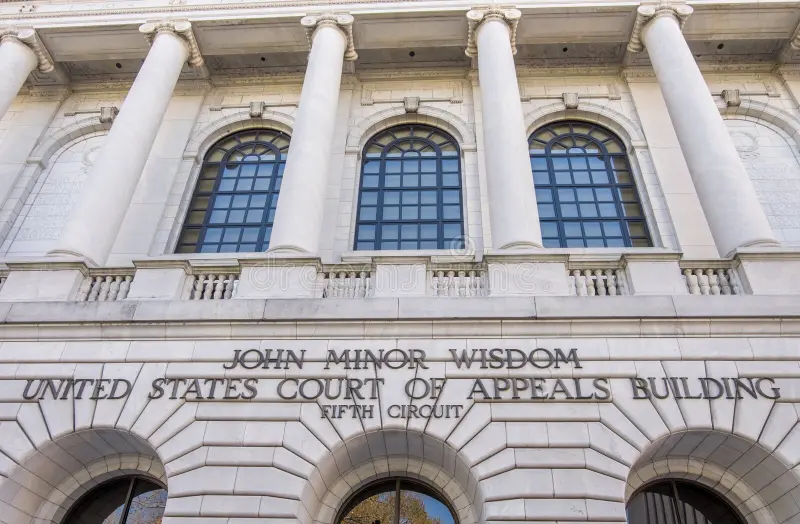
Andrew Strom is a union lawyer based in New York City. He is also an adjunct professor at Brooklyn Law School.
One basic element of the rule of law is that rules and principles are applied equally, regardless of which party benefits. When Donald Trump referred to “Obama judges” during his first term, Chief Justice John Roberts asserted, “We do not have Obama judges or Trump judges, Bush judges, or Clinton judges.” On one level, that’s nonsense. Of course there are ideological differences among judges. But, when statutes and precedents are clear, most judges will apply them, even if they wish they could rule otherwise. And then there are the judges Trump has appointed to the Fifth Circuit Court of Appeals. In AllService Plumbing & Maintenance Inc. v. NLRB, two of his appointees illustrated Trump’s view of the law when they ignored the applicable statute and precedents to reach their preferred outcome.
AllService Plumbing started as a routine case at the National Labor Relations Board. In 2009, the workers started a union organizing drive at this company owned by Luke and Janice Hall. Joe Lungrin, a supervisor who Janice Hall described as their “eyes and ears,” told workers that Luke Hall said he would close his doors before he went union. Then, Lungrin spied on workers at an off-site meeting with the union organizer. Lungrin also interrogated workers about their support of the union. One worker provided some information to the Union, and Lungrin said if Luke Hall found out who did it, Hall would “have his balls.” Shortly after the Union filed for an election, the company laid off three pro-Union workers.
The Union filed unfair labor practice charges against AllService, and on December 1, 2011, an Administrative Law Judge issued an opinion finding that the three workers were laid off because of their union sympathies. The ALJ further found that Lungrin was the company’s agent, and he had engaged in illegal surveillance and interrogation. AllService missed the deadline for filing exceptions to the ALJ’s opinion, and on January 18, 2012, the Board adopted the ALJ’s recommended order. The Board then scheduled a compliance hearing to determine the amount of backpay owed to the three laid off workers. Another ALJ issued a backpay decision on May 2, 2013, and once again AllService missed the deadline for filing exceptions. On July 16, 2013, the Board adopted the ALJ’s decision in the absence of exceptions.
Then, AllService got lucky. In 2014, the Supreme Court issued its decision in Noel Canning, finding that President Obama’s 2012 recess appointments were invalid, wiping out all the NLRB’s decisions issued from January 9, 2012 through August 1, 2013. This left the NLRB with a big backlog of cases to work through, and the AllService case fell through the cracks. Finally, on June 1, 2022, the NLRB issued a “Notice to Show Cause” why it shouldn’t just adopt the ALJ’s 2013 decision. AllService responded to this notice by asserting that it had suffered through two floods, causing it to lose records and experience financial hardship. The Board issued an order adopting the 2013 ALJ decision, explaining that AllService did not take issue with any of the ALJ’s findings or conclusions, and it did not raise any legal arguments contesting the ALJ’s rulings.
When the Board moved to enforce its order in the Fifth Circuit, AllService responded by arguing that enforcement should be denied due to the Board’s delay in processing the case, and in the alternative, the NLRB lacked substantial evidence for its finding that the three layoffs were due to the employees’ pro-Union sympathies. This should have been an easy case because the Supreme Court has held that the NLRB’s delays are not a valid basis for refusing to enforce a backpay order, and AllService’s arguments challenging the Board’s evidentiary findings were barred by its failure to make those arguments to the NLRB. But the two Trump appointees on the Fifth Circuit panel, Kurt Engelhardt and Andrew Oldham, were not going to let any legal niceties get in the way of ruling for this “Mom and Pop” shop.
The Board had conceded that backpay was only owed through 2013 when the workers had declined an offer of reinstatement. So, backpay was not continuing to accrue while the NLRB dawdled. Nevertheless, Engelhardt and Oldham decided that the Board cannot “force AllService to eat a stale, decade-old order.” Tellingly, they did not even acknowledge the impact of their ruling on the workers. This ruling would have been bad enough if Engelhardt and Oldham were writing on a clean slate. In fact, the Supreme Court had addressed this very issue in 1969, explaining that “the Board is not required to place the consequences of its own delay, even if inordinate, upon wronged employees to the benefit of wrongdoing employers.” Despite a dissent by Judge James Dennis (a Clinton appointee) pointing out the binding Supreme Court ruling, the majority did not even try to explain why the Supreme Court precedent did not apply.
As an alternative grounds for its decision, the majority found that the NLRB’s decision was not based on “substantial evidence.” Here, Engelhardt and Oldham simply ignored the text of the NLRA, which provides that a court may not consider any objection that has not been presented to the Board unless the failure is excused by “extraordinary circumstances.” The dissent pointed out that in multiple cases, the Fifth Circuit has held that the court may only consider those issues that were presented to the Board in exceptions to an ALJ’s decision. Thus, by not filing exceptions to either ALJ decision, AllService waived any challenge to those decisions. The majority held that the Board’s delay in processing the case constituted “extraordinary circumstances,” but that makes no sense because the delay occurred long after AllService missed its deadlines to file exceptions to the ALJs’ rulings.
The majority’s ruling on the merits was just as lawless as its rulings on the procedural issues. Engelhardt and Oldham decided that the ALJ erred in holding that Lungrin was acting as AllService’s agent when he relayed Hall’s threats to the workers. But Lungrin’s job was to communicate company directives to the workers. He was typically the only supervisor on site, and workers testified that they viewed him as their “boss.” The majority further faulted the ALJ for not addressing evidence that, in its view, undermined the ALJ’s conclusion that Luke Hall harbored anti-union animus. According to the majority, “multiple employees testified that Hall never expressed a negative opinion about the union.” As the dissent explained, this sentence refers to the testimony of two employees. One never heard Hall express any opinion about the union, and the other never had any conversation with Hall. The ALJ discredited Hall’s testimony based on his argumentative and sarcastic demeanor, and contradictions between his testimony and an affidavit he had given in the case. The dissent pointed out the majority seemed to be adopting a test that requires an ALJ to specifically address every piece of potentially contradictory evidence even where the parties do not call the evidence to the ALJ’s attention. If the majority’s test is unworkable, perhaps that’s the point.
It should come as little surprise that the author of the AllService opinion, Andrew Oldham, is a contender to be Trump’s next Supreme Court nominee.










Daily News & Commentary
Start your day with our roundup of the latest labor developments. See all
February 6
The California Supreme Court rules on an arbitration agreement, Trump administration announces new rule on civil service protections, and states modify affirmative action requirements
February 5
Minnesota schools and teachers sue to limit ICE presence near schools; labor leaders call on Newsom to protect workers from AI; UAW and Volkswagen reach a tentative agreement.
February 4
Lawsuit challenges Trump Gold Card; insurance coverage of fertility services; moratorium on layoffs for federal workers extended
February 3
In today’s news and commentary, Bloomberg reports on a drop in unionization, Starbucks challenges an NLRB ruling, and a federal judge blocks DHS termination of protections for Haitian migrants. Volatile economic conditions and a shifting political climate drove new union membership sharply lower in 2025, according to a Bloomberg Law report analyzing trends in labor […]
February 2
Amazon announces layoffs; Trump picks BLS commissioner; DOL authorizes supplemental H-2B visas.
February 1
The moratorium blocking the Trump Administration from implementing Reductions in Force (RIFs) against federal workers expires, and workers throughout the country protest to defund ICE.